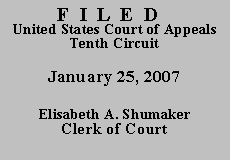

| UNITED STATES OF AMERICA, | No. 06-2270
(D.C. No. CR-06-1058 JC) (D.N.M.) |
On December 9, 2005, U.S. Border Patrol agents stopped Morales-Ramirez, along with seven other individuals, near Columbus, New Mexico. Morales-Ramirez admitted that he was a citizen of Mexico without authorization to be in the United States, and that he had previously been deported. A background check revealed that in 2004 he was convicted of Attempted Common Law Robbery, a felony, in Charlotte, North Carolina. On May 17, 2006, Morales-Ramirez pled guilty to the sole charge against him, illegal reentry, and was sentenced to 46 months' imprisonment at the bottom of his Guidelines range. He now appeals.
When an attorney conscientiously examines a case and determines that any appeal would be wholly frivolous, counsel may so advise the court and request permission to withdraw. Anders, 386 U.S. at 744. Counsel must submit a brief to the appellate court as well as to the client pointing to any potentially appealable issues. The client may then choose to offer any argument to the court. If, upon carefully examining the record, the court determines that the appeal is in fact frivolous, it may grant the request to withdraw and dismiss the appeal. Id. In the present case, acting pursuant to Anders, counsel provided Morales-Ramirez with a copy of the appellate brief and he has declined the opportunity to file a pro se brief.
Counsel's Anders brief raises two potentially appealable issues. First, the brief questions whether Morales-Ramirez's guilty plea was knowing and voluntary. We review a district court's determination of this issue de novo. United States v. Libretti, 38 F.3d 523, 529 (10th Cir. 1994). In deciding that a plea is knowing and voluntary, a district court must assess whether the defendant fully understands the consequences of the plea. Id. Under Federal Rule of Criminal Procedure 11(b)(1), defendants must be apprised of their rights, the nature of the charges against them, and the maximum and minimum penalties they face.
The district court properly conducted the required colloquy in this case, informing Morales-Ramirez of the rights he would waive by pleading guilty, and asking him whether he was under the influence of drugs or alcohol, whether he was being treated for any illness, or if he had been threatened or coerced into pleading guilty. At the court's request, the prosecutor read to Morales-Ramirez the penalties he faced. Nothing in the record leads us to doubt Morales-Ramirez's answers on the day of the plea hearing. Accordingly, we hold that the district court did not err in finding Morales-Ramirez knowingly and voluntarily entered his guilty plea.
Counsel also draws our attention to Morales-Ramirez's sentence. We review a sentence for reasonableness. United States v. Kristl, 437 F.3d 1050, 1053 (2006). A sentence that falls within a properly calculated Guidelines range is presumptively reasonable. Id. Factual findings made by the district court are reviewed for clear error and legal determinations are reviewed de novo. United States v. Serrata, 425 F.3d 886, 906 (10th Cir. 2005).
Morales-Ramirez's Presentence Report (PSR) correctly calculated an offense level of 21 and a criminal history category of III. The Guidelines provide a base offense level of eight for illegal reentry and a 16-level enhancement if that reentry occurs after a deportation following a conviction for a felony crime of violence. U.S.S.G. §§ 2L1.2(a) & (b)(1)(A)(ii). Morales-Ramirez then received a three-level reduction for acceptance of responsibility. His criminal history category of III was properly based on prior convictions for Receiving Stolen Property and Attempted Common Law Robbery.
Morales-Ramirez objected to the 16-level enhancement, arguing that the narrative describing his conviction for Attempted Common Law Robbery was incorrect, but admitting to the conviction itself. Attempted Robbery is a crime of violence under the Guidelines. U.S.S.G. § 2L1.2 cmt. (B)(iii). The district court considered Morales-Ramirez's objection, as well as the 18 U.S.C. § 3553(a) factors in determining that a 46-month sentence was appropriate. Morales-Ramirez has done nothing to overcome the presumption of reasonableness afforded his sentence. Kristl, 437 F.3d at 1053. Even without that presumption, however, we conclude that a 46-month sentence is reasonable under the circumstances.
Because we are not presented with any meritorious grounds for appeal, we GRANT counsel's request to withdraw, AFFIRM the sentence, and DISMISS the appeal.
ENTERED FOR THE COURT
Carlos F. Lucero
Circuit Judge
*. The case is unanimously ordered submitted without oral argument pursuant to Fed. R. App. P. 34(a)(2) and 10th Cir. R. 34.1(G). This order and judgment is not binding precedent except under the doctrines of law of the case, res judicata and collateral estoppel. It may be cited, however, for its persuasive value consistent with Fed. R. App. P. 32.1 (eff. Dec. 1, 2006) and 10th Cir. R. 32.1 (eff. Jan. 1, 2007).